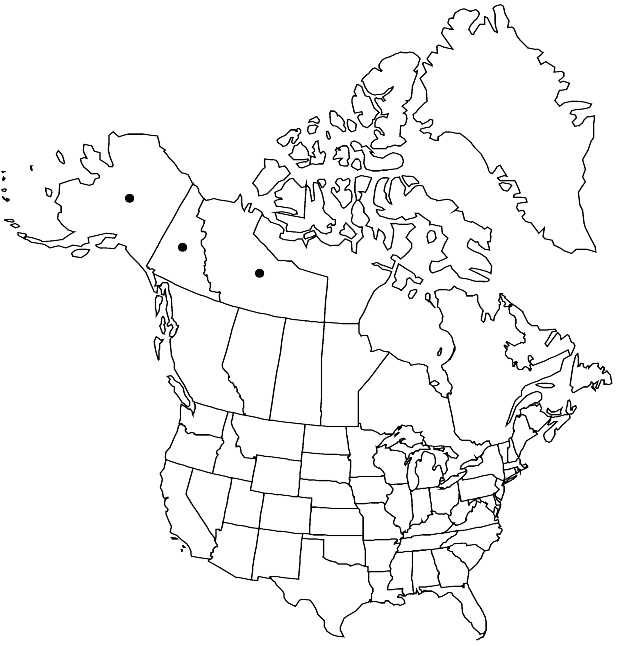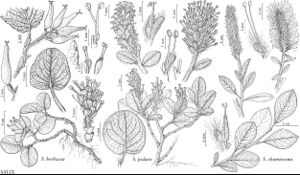Salix chamissonis
in A. P. de Candolle and A. L. P. P. de Candolle, Prodr. 16(2): 290. 1868.
Plants 0.03–0.1 m, (dwarf), forming clones by layering. Stems long-trailing; branches red-brown, glabrous; branchlets yellow-green, glabrous. Leaves: stipules foliaceous; petiole 5–13 mm, (sometimes with 1–2 pairs of spherical glands distally); largest medial blade hypo-stomatous, broadly elliptic, subcircular, or obovate, 30–50 × 17–30 mm, (1.1–)1.6–1.9(–2.1) times as long as wide, base cuneate, margins flat, closely and prominently serrulate or spinulose-serrulate, (teeth 7–14 per cm), apex acuminate, convex, acute, or rounded, abaxial surface glaucous, glabrous, adaxial slightly glossy, glabrous; proximal blade margins entire, closely gland-dotted, or serrulate; juvenile blade glabrous or sparsely long-silky abaxially. Catkins: staminate 30–64 × 12–22 mm, flowering branchlet 4–28 mm; pistillate densely or moderately densely flowered, stout, 32–73(–105 in fruit) × 10–17 mm, flowering branchlet 4–28 mm; floral bract brown or black, 1.2–2.8 mm, apex convex or rounded, entire, abaxially moderately densely hairy, hairs straight. Staminate flowers: abaxial nectary absent, adaxial nectary square, 0.5–0.9 mm; filaments distinct, glabrous; anthers ellipsoid or shortly cylindrical, 0.5–0.6 mm. Pistillate flowers: abaxial nectary absent, adaxial nectary square or oblong, 0.3–1 mm, equal to or longer than stipe; stipe 0.2–0.4 mm; ovary obclavate, pilose or villous, hairs ribbonlike, (sometimes in patches or streaks, refractive), beak gradually tapering to styles; ovules 12–18 per ovary; styles 0.8–1.2 mm; stigmas flat, abaxially non-papillate with rounded or pointed tip, or slenderly cylindrical, 0.4–0.7 mm. Capsules 5–7 mm. 2n = 114.
Phenology: Flowering mid-late Jun.
Habitat: Arctic-alpine, Dryas heath tundra, dwarf birch-lichen tundra, sandy lakeshores, snowbeds, rock stripes or gravel, wet seepage areas, sedge meadows, willow-dwarf birch-sphagnum bogs, limestone and shale substrates
Elevation: 0-1500 m
Distribution

N.W.T., Yukon, Alaska, e Asia (Chukotka, Commander Islands, Russian Far East, disjunct in Sakhalin).
Discussion
Salix chamissonis is disjunct on Attu Island in Alaska.
Selected References
None.
